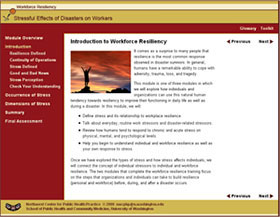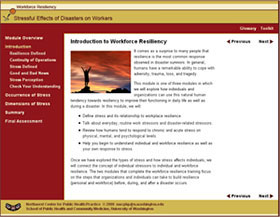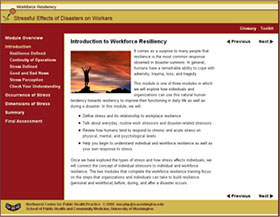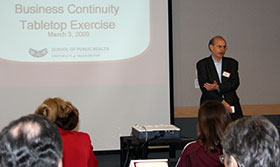Description
Stress infiltrates our lives every day and has effects beyond what we usually realize. This 45-minute online course is part three of the Workforce Resiliency series, which provides information about individual and organizational resiliency in the face of stress, emergencies, and disasters. In this final installment, During and After a Disaster, details steps that you and your organization can take to maintain and restore resiliency during and after a disaster or emergency.
Learning Objectives
- List goals that organizations can set to help them maintain and build resiliency
- List actions that organizations can take to sustain and increase resiliency during and after a disaster
- Identify potential problems that may occur during a disaster response and determine solutions that can help alleviate the stressors that can occur
- List actions that individuals can take to increase and sustain resilience during and after a disaster
Intended Audience
Public health administrators and managers; other public health professionals; nurses; first responders; and rescue workers
Workforce Resiliency Series
Part One: Stressful Effects of Disasters on Workers
Part Two: Individual and Organizational Preparedness
Part Three: During and After a Disaster
Format
These online courses have interactive exercises. Each course takes approximately forty-five minutes to complete.
Module Instructor
Randal Beaton, PhD, EMT
Research Professor, School of Nursing
Adjunct Research Professor, Health Services
Northwest Center for Public Health Practice
School of Public Health, University of Washington
Technical Requirements
These courses require certain software and browser plugins to be installed. See our Technical Requirements page for details.
Accessibility
This online training course is text-based and designed for accessibility. A print version of this course is also available in the Supplemental Material section at the bottom of this page. Please note that the print version does not include interactive exercises, quizzes, or the final assessment. Flash-based interactive exercises and quizzes in the course may not be accessible to screen readers. To receive a print version of the quizzes, please contact nwcphp@u.washington.edu. If you have any difficulties in accessing the information given in any of our documents or need further assistance, please contact nwcphp@u.washington.edu.



